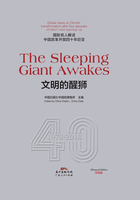
Pakistan Needs to Learn Lessons of Reform
Understanding the circumstances under which such historical decisions were taken and their implications is important

Muhammad Asif Noor
Muhammad Asif Noor is Founder Director of Institute of Peace and Diplomatic Studies and Secretary General Pakistan-Shanghai Cooperation Organization Friendship Forum. Mr. Asif is Founder Editor-In-Chief of Monthly The Diplomatic Insight. Recently at the Institute, Mr. Asif established Centre for Belt and Road Initiative and China Pakistan Economic Corridor Studies. His areas of expertise are SCO, BRI and Central Asian Region.
It is four decades since Deng Xiaoping announced reform and opening-up which has brought China to where it is right now:from deep rooted poverty and a low income to becoming the second largest economy in the world. While the Chinese people celebrate their glory of the last 40 years of hard work and its fruition, it is also a good time to reflect on China's reforms and understand the path traveled, knowing the circumstances under which such historical decisions were taken and the implications of these reforms on China.
This transformational phase of China's glorious achievements has also encouraged other developing countries such as Pakistan to follow the model of development that may help the country to move from “rags to riches” within a generation. For instance, the open trade policy established China an economic juggernaut in the global market with the world's largest foreign reserves, second-highest GDP, and third place in foreign direct investment.
Today, China's share in the global economy has reached a staggering 15 percent from a mere 1.8 percent in 1978. It is not just an emerging economy but has returned to its former status as a major economic power.
The Pakistani government led by Prime Minister Imran Khan has expressed the desire to learn from China about the process to help the country and citizens to emerge out of abject poverty. The reforms were gradual but effective and they followed the Chinese model which is in sharp contrast to the European or any other Western model of reforms.
Gradually opening up to new ventures, foreign trade and investment has helped the country to diversify its strength through ownership, micro and macroeconomic stability, and control on inflation which later led to savings which leads to investment. With visionary leadership, Deng at the Third Plenum of the 11th Central Committee of the Chinese Communist Party in 1978, and now President Xi Jinping, have steered the nation to the highest of accomplishments in the history of mankind.
Forty years after Deng's reforms, the world is now witnessing more advanced policies under the leadership of President Xi, who has set ambitious goals for the country's economic growth. President Xi's target is to convert the world's second-largest economy into a global leader and great manufacturing power. President Xi not only has initiated various domestic reforms to lead the world in a new era of the “China Dream” and to rejuvenate the country through economic growth and modernization but also showed a consistent commitment to continuing Deng's legacy of economic reforms and opening to the world, including at the G20 Summit in 2016, the Davos Forum in 2017 and the Boao Forum earlier in 2018. Public development has played an important role in establishing China as a major global economic power as it has experienced the fastest sustained expansion by a major economy in history and has lifted more than 800 million people out of poverty, according to the World Bank.
Thus, the current boost in the Chinese economy and trade is a result of its continuing economic reforms and opening to foreign investment. China's Belt and Road Initiative is one good example. Open markets played a crucial role in transforming the Chinese economy. China has been among the world's fastest growing economies, with annual economic growth 9.5 percent.
With unprecedented transformation for the past four decades, the political change and economic transformation has seen an increase in interaction and competition between China and the world. New centers of power of strategic, economic and political nature have emerged while the old power centers are declining. The new powerhouse in the shape of China is not making unilateral actions but taking on board all countries with the vision of a shared destiny through stability, peace and prosperity.
The gigantic China-Pakistan Economic Corridor (CPEC) is on its way to complete the next phase. The CPEC has provided Pakistan the desired boost to support the crippled economy. It was a helping hand from a friend and brother that has often stood by Pakistan through thick and thin. Pakistan's economy is facing the challenges of increased debt and many other issues of an unprecedented nature
and the leader of the current government wishes to learn from Chinese wisdom to help the country move from rags to riches.
Pakistan needs to formulate reforms taking into consideration all its vulnerabilities and challenges with a sound mind and vision. The reforms should be in all sectors including economic, social, political, development and judicial with a single focus on achieving economic development.
Pakistan also needs to allocate its resources in a manner to build the financial structures to help boost the economic base. Based on long and short-term plans, Pakistan can achieve long-term goals. The government needs to follow the leadership style and consistent efforts of the Chinese leaders. There is a strong need to separate governance and politics in Pakistan and efforts to remove the menace of corruption. Pakistan is a developing economy with ample resources bestowed by nature and the only need is that our leadership concentrates on involving all stakeholders instead of resorting to old slogans and practices.